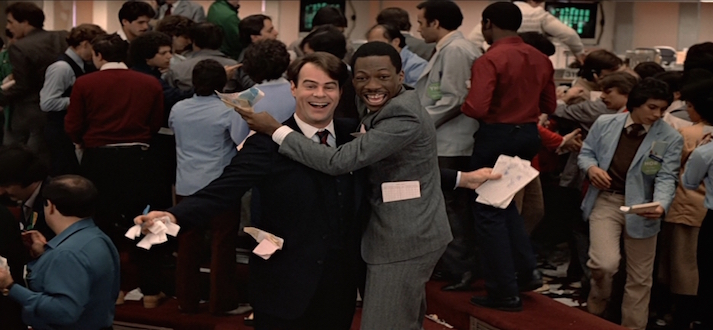The Nigerian stock market has become the proverbial successful child who everyone wants to associate with. The NSE All Share Index went up by 42% last year, and has already done a whopping 15% in January alone.
While retail investors are getting excited about the market again, smart money has begun exiting their positions. Here are a few tips on how one can be a successful trader.
Paying attention to results
Results are key drivers of prices on the Nigerian Stock Exchange (NSE). Top traders get into a stock before the full year results are released, when the results are positive and consistent. They also exit a stock when a company has had consistent negative quarterly results. Amateurs wait till full year results are released, when most of the upside or downside would have been priced in.
Case study: Everyone could see that Dangote flour had an impressive result after it was taken over. The company had paid down its debt,retained earnings and become healthy. Ideally, that would have been the best time to go in. Not when the stock has done over 100%.
The same applied to FMCGs that were massively hit by foreign exchange losses. The losses were a one-time thing, but the markets punished the stocks heavily. Successful traders held on because the foreign exchange issue was one that would eventually be sorted out.
Pre-market and 14.29 are important
Top traders typically make their plays during pre-market and a few minutes to market close. Pre-market is between 9.30 and 10.14am on the NSE. It often shows the stocks that are in play. One can then decide to position on either the buy or sell side depending on the direction of demand.
The same protocol applies to 14.29 or market close. Stocks that often pop up during this period often make last minute gains or losses. The pattern also continues consistently for some trading days or when a stock is in the news.
Buying during the middle of the trading session is typically sluggish.
Successful traders always cash in profits
Successful traders always convert their paper profits to actual cash, no matter how little. While it’s nice to look at your portfolio when it’s all green, those are just paper profits. You have not actually made profits as a trader until you have cashed in or converted paper gains to actual profits. A 30% profit could turn to a loss in 3 or 4 trading sessions.
Pay attention to the larger economy
The stock market does not operate in a bubble; it mirrors the larger economy. The NSE’s performance is largely correlated with the price of crude oil. Foreign exchange liquidity also plays a key role since the market is mostly driven by foreign investors.
Gurus in trading got into the market when the exchange rate crisis was easing off.Not when Nigeria hit $60 billion in reserves. The smart traders will also exit in the event of an oil price shock, way before it reflects in the foreign exchange market
Stick to what works for you
Top traders are successful because they stick to strategies that work for them. It doesn’t mean that they don’t adapt other strategies. They only do so when theirs stops working.
There are over 100 securities on the NSE. They don’t trade all stocks. They find a niche and stick to it;be it large cap stocks, or just stocks in a particular sector.
Tread your own path
Traders who make it to the top in the market do not follow the crowd. They exit their positions when the entire market has keyed into them. Markets tend to follow the NSE 30, but practically any stock can be traded for short term gains.
Case study: First Bank traded at N5 for a large part of last year. The bank has had to make provisions running into hundreds of billions of nairas a result of bad loans to the oil and gas sector. But house cleaning by the new management means that the stock is on its way to recovery.
The right time to buy the stock would have been when it was weather-beaten at N5. Successful traders would have exited their holdings by now, having done over a 100% on their entry price.
Top traders do their own research
Traders who top the market do their own research. They attend the boring annual general meetings and ‘Facts Behind the Figures’ presentations. During events like this, management can speak explicitly because they are put on the spot, and not hide behind the fluffy press releases issued.
The real information is contained in the annual reports and quarterly statements, which the regular investor tends to pass on. They prefer to read a 2 or 3 page summary, by investment houses, which may not tell the full story.
Use several trading platforms
Successful traders know that platforms can suddenly go offline without prior notice – sometimes for days or weeks. To avoid being stuck, they trade using several platforms.
Case in point: Morgan Capital suspended operations for several weeks last year. CSL stockbrokers also had a few down days on their online platform. For traders with no other platform, that meant losses running into millions of naira.
Top traders do not develop emotional attachments to a stock
Because a stock has done well does not mean that it will repeat the same performance in the future. There is no need holding a stock on the premise that it once did well. Traders who do well do not develop attachments to particular stocks. It is not a human being and even human beings don’t play together forever.
Deduct your fees from your profit
Stockbrokers have various charges for their online platform which are not uniform, so deduct them accordingly. Also deduct other costs such as data and power. This will enable you to know if you are making a profit or just breaking even.
Avoid over-trading
Experienced traders avoid the need to constantly trade, since they have developed a strategy that works for them. Constantly trading leads to fees piling up and makes inexperienced traders constantly second guess themselves.
Conclusion
Trading stocks can be interesting and very profitable, but you have to be mindful that you are not running your business at a loss while doing it. Learn from these tips and join the league of top traders.

























